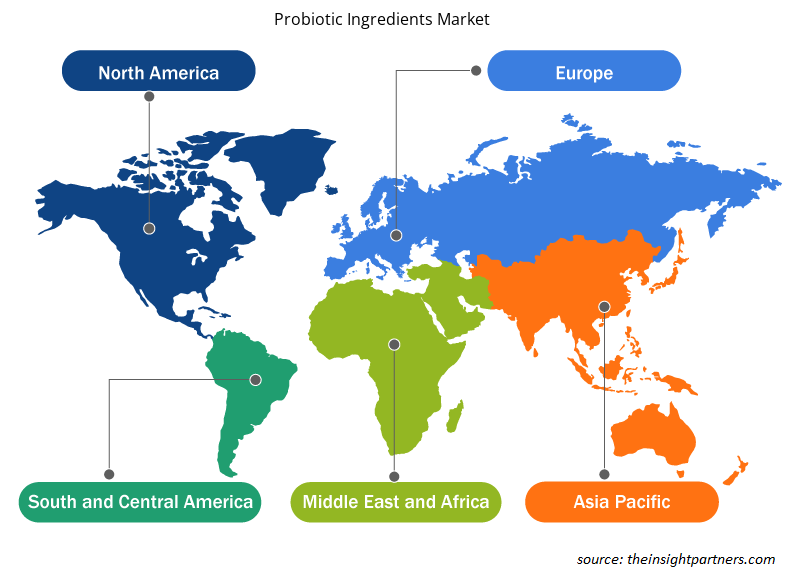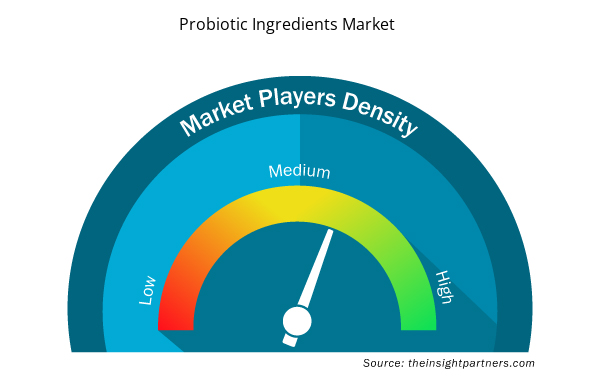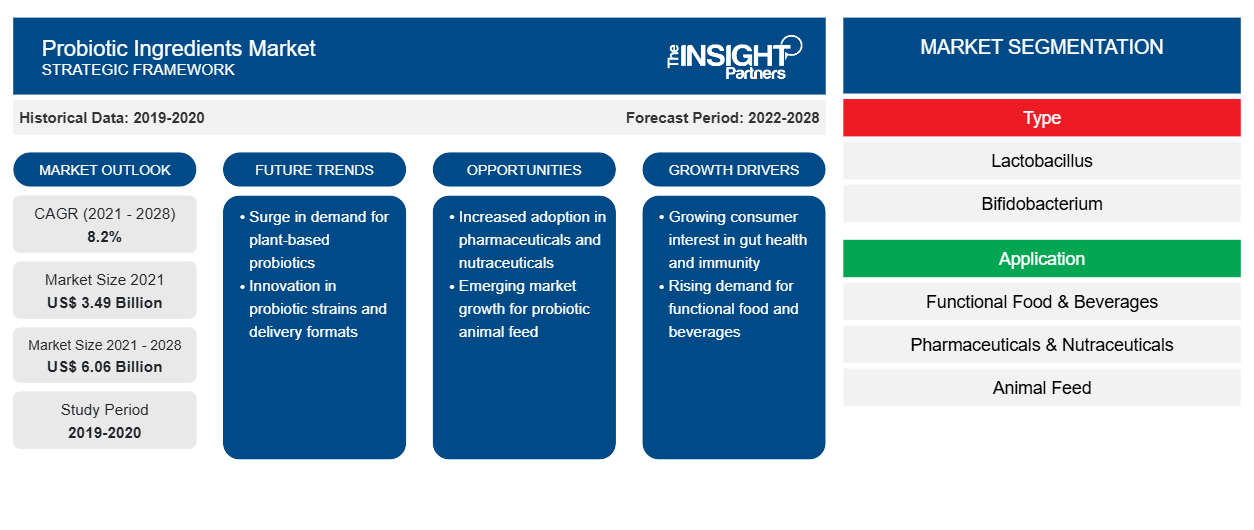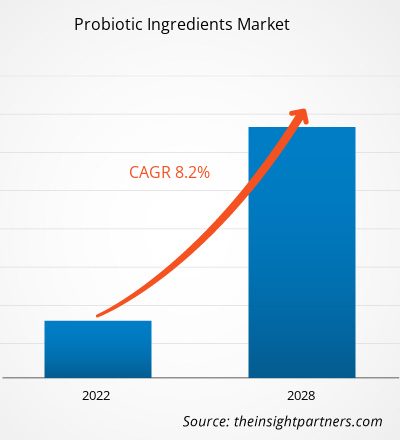益生菌成分市场预计将从 2021 年的 34.9342 亿美元增长到 2028 年的 60.6051 亿美元;预计 2022 年至 2028 年的复合年增长率为 8.2%。
益生菌是活的微生物,食用后通常通过改善或恢复肠道菌群来提供健康益处。益生菌通常被认为是安全的。益生菌在预防保健中发挥着重要作用,因为它们通过增强免疫系统来预防疾病的发生。因此,预防保健意识的提高预计将在预测期内推动市场增长。
2021 年,亚太地区占据了益生菌成分市场的最大份额,而中东和非洲等其他发展中地区预计在预测期内也将大幅增长。市场增长归因于对功能性食品和饮料(如可饮用益生菌酸奶和原味酸奶)的需求不断增加,以及西方文化对该地区年轻人口的影响日益增强。此外,益生菌制造商正在亚太地区扩大业务,因为该地区有潜在客户群、廉价劳动力和充足的制造设施。Probi 和 Bio-k+(Kerry)等公司在该地区积极运营;预计这将在未来几年推动亚太地区益生菌成分市场的发展。
定制此报告以满足您的需求
您可以免费定制任何报告,包括本报告的部分内容、国家级分析、Excel 数据包,以及为初创企业和大学提供优惠和折扣
- 获取此报告的关键市场趋势。这个免费样品将包括数据分析,从市场趋势到估计和预测。
COVID-19 疫情对益生菌成分市场的影响
2020 年初,COVID-19 疫情给许多行业带来了前所未有的挑战。封锁、边境限制、旅行禁令、生产停工以及各国政府根据世卫组织和各国卫生部指导方针实施的其他安全措施阻碍了制造业的运营。然而,COVID-19 疫情对市场产生了积极影响,因为消费者越来越多地寻求天然、更安全的替代品来保持健康并增强免疫系统。在疫情爆发的最初几个月,对膳食补充剂的需求急剧增加。此外,由于政府要求人们待在家里,他们注重健康和健身,这刺激了疫情期间对益生菌的需求。
市场洞察
益生菌强化食品和饮料的需求不断增长
消费者越来越注重健康,更加关注自己的生活方式和饮食,导致全球对益生菌强化食品和饮料的需求激增。为了满足消费者的需求,食品制造商正在开发各种带有说明和图片的新产品,以响应当前的健康饮食趋势。例如,日本公司 Yakult Honsha 于 1955 年推出了一款益生菌乳制品饮料,遭到多位行业专家的驳斥;然而,目前,它是亚太地区、欧洲和北美最大的益生菌乳制品品牌,正在推动市场的增长。
基于类型的洞察
根据类型,益生菌成分市场细分为乳酸杆菌、双歧杆菌和其他。预计乳酸杆菌部分将在预测期内占据最大份额。它被认为是用作益生菌的最安全的细菌之一。乳酸杆菌是一种主要用于发酵食品(如开菲尔、酸菜和酸奶)的细菌。乳酸杆菌菌株对人类有益,因为它们可以减少人体肠道疾病,预计这将增加其需求。乳酸杆菌部分的增长是由益生菌在食品(尤其是乳制品)中的应用不断增加所驱动的,从而推动了市场的增长。
基于应用的洞察
根据应用,益生菌成分市场细分为功能性食品和饮料、药品和保健食品、动物饲料等。预计在预测期内,药品和保健食品部门的复合年增长率最高。预防药物需求的增加、老年人消化系统疾病的增加以及饮食不均衡可能会增加膳食补充剂行业的产品需求。由于不健康饮食的普及,消费者越来越喜欢益生菌食品补充剂。
益生菌成分市场的主要参与者是 ADM、Novozymes A/S、Chr. Hansen Holding A/S、Kerry、Lallemand Inc.、IFF Nutrition & Biosciences、AngelYeast Co., Ltd.、Probiotical SpA、Adisseo 和 Probi。这些参与者致力于开发降低健康风险的产品,以满足新兴的消费趋势并遵守监管框架。他们参与并购、业务扩张和合作,以扩大其市场份额。
益生菌成分市场区域洞察
Insight Partners 的分析师已详细解释了预测期内影响益生菌成分市场的区域趋势和因素。本节还讨论了北美、欧洲、亚太地区、中东和非洲以及南美和中美洲的益生菌成分市场细分和地理位置。

- 获取益生菌成分市场的区域特定数据
益生菌成分市场报告范围
| 报告属性 | 细节 |
|---|---|
| 2021 年市场规模 | 34.9亿美元 |
| 2028 年市场规模 | 60.6 亿美元 |
| 全球复合年增长率(2021 - 2028) | 8.2% |
| 史料 | 2019-2020 |
| 预测期 | 2022-2028 |
| 涵盖的领域 | 按类型
|
| 覆盖地区和国家 | 北美
|
| 市场领导者和主要公司简介 |
|
益生菌成分市场参与者密度:了解其对业务动态的影响
益生菌成分市场正在快速增长,这得益于终端用户需求的不断增长,而这些需求又源于消费者偏好的不断变化、技术进步以及对产品益处的认识不断提高等因素。随着需求的增加,企业正在扩大其产品范围,进行创新以满足消费者的需求,并利用新兴趋势,从而进一步推动市场增长。
市场参与者密度是指在特定市场或行业内运营的企业或公司的分布情况。它表明在给定市场空间中,相对于其规模或总市场价值,有多少竞争对手(市场参与者)存在。
在益生菌成分市场运营的主要公司有:
- 腺苷二磷酸
- 诺维信公司
- 科汉森控股公司
- 凯里集团有限公司
- 拉曼公司
免责声明:上面列出的公司没有按照任何特定顺序排列。

- 获取益生菌成分市场顶级关键参与者概览
报告亮点
- 益生菌成分市场不断发展的行业趋势,帮助参与者制定有效的长期战略
- 采取业务增长战略以确保发达市场和发展中市场的增长
- 2022 年至 2028 年益生菌成分市场定量分析
- 全球益生菌需求量估计
- 波特五力分析说明了行业内买家和供应商的效力
- 了解竞争市场状况的最新发展
- 市场趋势和前景,以及影响益生菌成分市场增长的因素
- 通过强调支撑商业利益的市场策略来协助决策过程,从而促进市场增长
- 益生菌成分市场不同节点的规模
- 市场和益生菌行业动态的详细概述和细分
- 各地区增长规模及增长机遇
- 历史分析(2 年)、基准年、预测(7 年)及复合年增长率
- PEST 和 SWOT 分析
- 市场规模价值/数量 - 全球、区域、国家
- 行业和竞争格局
- Excel 数据集



Report Coverage
Revenue forecast, Company Analysis, Industry landscape, Growth factors, and Trends

Segment Covered
This text is related
to segments covered.

Regional Scope
North America, Europe, Asia Pacific, Middle East & Africa, South & Central America

Country Scope
This text is related
to country scope.
常见问题
The increasing consumer focus in preventive health driving global probiotic ingredients market. Over the past few years, the awareness regarding health and nutrition has increased significantly. Because of hectic work schedules and extended working hours, people cannot concentrate on their daily diet, health, and fitness, thereby leading to various health issues such as obesity, diabetes, and digestive problems. Therefore, people increasingly focus on preventive health and prefer dietary supplements that offer enhanced health benefits without harmful effects. Thus, people are getting more aware of digestive health and prefer to consume probiotics. These dietary supplements improve digestion and nutrient absorption. Thus, the rising consumers focus on preventive health the demand for probiotic-infused dietary supplements that offer nutritional benefits also increased and is further driving the growth of the probiotic ingredients market.
Based on the application, pharmaceuticals and nutraceuticals segment is projected to grow at the fastest CAGR over the forecast period. Probiotic ingredients have demonstrated their high potential to treat various diseases, including neurodegenerative disorders, cancers, cardiovascular diseases, and inflammatory diseases. Probiotic ingredients are also effective against multidrug-resistant pathogens and help maintain a balanced gut microbiota ecosystem. The rising demand for preventive medicines, an increased number of digestive ailments among the elderly, and a lack of a balanced diet are likely to boost the product demand in the dietary supplement industry. Consumers increasingly prefer probiotics-based food supplements owing to the growing adoption of unhealthy diets. Moreover, the rising consumption of dietary supplements is boosting the demand for probiotic ingredients in the nutraceuticals industry.
The major players operating in the global probiotic ingredients market are ADM; Novozymes A/S; Chr. Hansen Holding A/S; Kerry; Lallemand Inc.; IFF Nutrition & Biosciences; AngelYeast Co., Ltd.; Probiotical S.p.A.; Adisseo; and Probi.
Declining use of anti-biotics in animal feed anticipated lucrative opportunities for the growth of probiotics market. Also, there is shift in consumers demand for safe food production. The use of probiotic ingredients as a possible alternative to antibiotics has received renewed interest due to the legislation prohibiting the use of sub-therapeutic amounts of antibiotics. Growing knowledge of the benefits of probiotics for animal health among pet owners, cattle farmers, and hobbyists is a huge opportunity for probiotics manufacturing companies. Also, development strategies by the key players are projected to open lucrative opportunities in the probiotic ingredients market over the forecast period.
Based on type, Lactobacillus segment have largest revenue because, Lactobacillus species are probiotics present in the digestive and urinary systems of humans, and they can be used to treat diarrhea and improve gut health. Lactobacillus is a type of good bacteria that helps the body break down food, absorb nutrients, and fight off disease-causing bacteria. It is considered one of the safest bacteria used as probiotics. Lactobacillus is a type of bacteria that primarily finds application in fermented foods such as kefir, sauerkraut, and yogurt. Lactobacillus strains are helpful to people because they can reduce human intestinal disorders, which is expected to boost its demand. The growth of the lactobacillus segment is driven by the rising application of probiotic ingredients in food, such as dairy products.
Asia Pacific accounted for the largest share of the global probiotic ingredients market. The market growth is attributed to increasing demand for functional food and beverages, especially drinkable probiotic yogurt and plain yogurt, coupled with the growing influence of western culture on the young population in the region. The region’s probiotics industry is rapidly advancing with the rising consumption of pharmaceuticals and nutraceuticals. In Asia Pacific, the demand for vitamins and dietary supplements increased during the COVID 19. For example, people have been looking after their health since the COVID 19 and seek immunity-boosting products such as vitamin C or ginseng. Moreover, the manufacturers of probiotic ingredients are expanding their operations across Asia Pacific owing to the presence of a potential customer base, cheap labor, and adequate manufacturing facilities. Companies such as Probi and Bio-k+ (Kerry) operate actively in the region; this is projected to drive the Asia Pacific probiotic ingredients market over the coming years.
Trends and growth analysis reports related to Food and Beverages : READ MORE..
The List of Companies - Probiotic Ingredients Market
- ADM
- Novozymes A/S
- Chr. Hansen Holding A/S
- Kerry Group Plc.
- Lallemand Inc.
- IFF Nutrition & Bisosciences
- AngelYeast Co., Ltd.
- Probiotical S.p.A.
- Adisseo
- Probi
The Insight Partners performs research in 4 major stages: Data Collection & Secondary Research, Primary Research, Data Analysis and Data Triangulation & Final Review.
- Data Collection and Secondary Research:
As a market research and consulting firm operating from a decade, we have published and advised several client across the globe. First step for any study will start with an assessment of currently available data and insights from existing reports. Further, historical and current market information is collected from Investor Presentations, Annual Reports, SEC Filings, etc., and other information related to company’s performance and market positioning are gathered from Paid Databases (Factiva, Hoovers, and Reuters) and various other publications available in public domain.
Several associations trade associates, technical forums, institutes, societies and organization are accessed to gain technical as well as market related insights through their publications such as research papers, blogs and press releases related to the studies are referred to get cues about the market. Further, white papers, journals, magazines, and other news articles published in last 3 years are scrutinized and analyzed to understand the current market trends.
- Primary Research:
The primarily interview analysis comprise of data obtained from industry participants interview and answers to survey questions gathered by in-house primary team.
For primary research, interviews are conducted with industry experts/CEOs/Marketing Managers/VPs/Subject Matter Experts from both demand and supply side to get a 360-degree view of the market. The primary team conducts several interviews based on the complexity of the markets to understand the various market trends and dynamics which makes research more credible and precise.
A typical research interview fulfils the following functions:
- Provides first-hand information on the market size, market trends, growth trends, competitive landscape, and outlook
- Validates and strengthens in-house secondary research findings
- Develops the analysis team’s expertise and market understanding
Primary research involves email interactions and telephone interviews for each market, category, segment, and sub-segment across geographies. The participants who typically take part in such a process include, but are not limited to:
- Industry participants: VPs, business development managers, market intelligence managers and national sales managers
- Outside experts: Valuation experts, research analysts and key opinion leaders specializing in the electronics and semiconductor industry.
Below is the breakup of our primary respondents by company, designation, and region:

Once we receive the confirmation from primary research sources or primary respondents, we finalize the base year market estimation and forecast the data as per the macroeconomic and microeconomic factors assessed during data collection.
- Data Analysis:
Once data is validated through both secondary as well as primary respondents, we finalize the market estimations by hypothesis formulation and factor analysis at regional and country level.
- Macro-Economic Factor Analysis:
We analyse macroeconomic indicators such the gross domestic product (GDP), increase in the demand for goods and services across industries, technological advancement, regional economic growth, governmental policies, the influence of COVID-19, PEST analysis, and other aspects. This analysis aids in setting benchmarks for various nations/regions and approximating market splits. Additionally, the general trend of the aforementioned components aid in determining the market's development possibilities.
- Country Level Data:
Various factors that are especially aligned to the country are taken into account to determine the market size for a certain area and country, including the presence of vendors, such as headquarters and offices, the country's GDP, demand patterns, and industry growth. To comprehend the market dynamics for the nation, a number of growth variables, inhibitors, application areas, and current market trends are researched. The aforementioned elements aid in determining the country's overall market's growth potential.
- Company Profile:
The “Table of Contents” is formulated by listing and analyzing more than 25 - 30 companies operating in the market ecosystem across geographies. However, we profile only 10 companies as a standard practice in our syndicate reports. These 10 companies comprise leading, emerging, and regional players. Nonetheless, our analysis is not restricted to the 10 listed companies, we also analyze other companies present in the market to develop a holistic view and understand the prevailing trends. The “Company Profiles” section in the report covers key facts, business description, products & services, financial information, SWOT analysis, and key developments. The financial information presented is extracted from the annual reports and official documents of the publicly listed companies. Upon collecting the information for the sections of respective companies, we verify them via various primary sources and then compile the data in respective company profiles. The company level information helps us in deriving the base number as well as in forecasting the market size.
- Developing Base Number:
Aggregation of sales statistics (2020-2022) and macro-economic factor, and other secondary and primary research insights are utilized to arrive at base number and related market shares for 2022. The data gaps are identified in this step and relevant market data is analyzed, collected from paid primary interviews or databases. On finalizing the base year market size, forecasts are developed on the basis of macro-economic, industry and market growth factors and company level analysis.
- Data Triangulation and Final Review:
The market findings and base year market size calculations are validated from supply as well as demand side. Demand side validations are based on macro-economic factor analysis and benchmarks for respective regions and countries. In case of supply side validations, revenues of major companies are estimated (in case not available) based on industry benchmark, approximate number of employees, product portfolio, and primary interviews revenues are gathered. Further revenue from target product/service segment is assessed to avoid overshooting of market statistics. In case of heavy deviations between supply and demand side values, all thes steps are repeated to achieve synchronization.
We follow an iterative model, wherein we share our research findings with Subject Matter Experts (SME’s) and Key Opinion Leaders (KOLs) until consensus view of the market is not formulated – this model negates any drastic deviation in the opinions of experts. Only validated and universally acceptable research findings are quoted in our reports.
We have important check points that we use to validate our research findings – which we call – data triangulation, where we validate the information, we generate from secondary sources with primary interviews and then we re-validate with our internal data bases and Subject matter experts. This comprehensive model enables us to deliver high quality, reliable data in shortest possible time.


 获取此报告的免费样本
获取此报告的免费样本